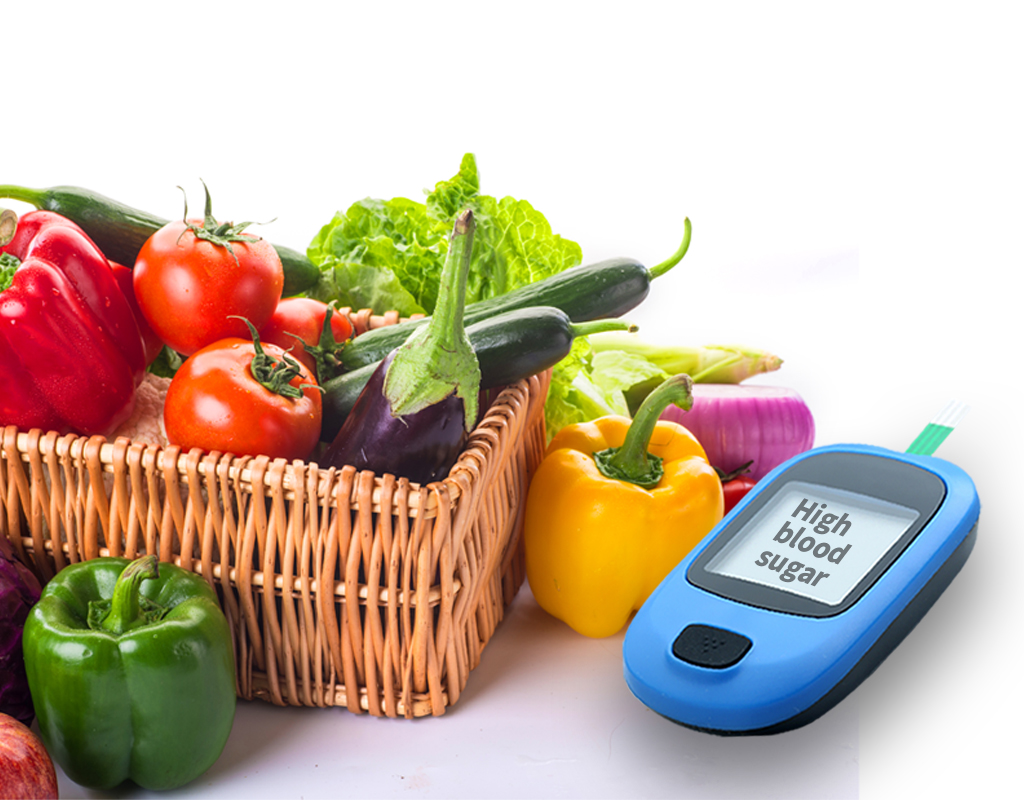Diet for Diabetes
Diabetes is a chronic metabolic disorder characterized by high blood sugar level and disordered insulin metabolism.syptoms includes frequent urination, increased thirst, and increased hunger. Proper diet plays a big role in diabetes management. In order to reduce the blood sugar levels, sometimes diet and exercise would be sufficient. Diabetes management revolves around glycemic control.Acheiving a good glycemic control requires right nutritional therapy. Understanding foods and their effects on blood glucose levels is thus critical for diabetic care
A diabetes diet simply means eating the healthiest foods in moderate amounts and sticking to regular mealtimes. A healthy-eating plan that’s naturally rich in nutrients and low in fat and calories. Key elements are fruits, vegetables and whole grains. In fact, a diabetes diet is the best eating plan for most everyone.
Easy way to control blood sugar
- Limit the quantity of foods
- Meals at correct time
- Include variety of vegetables
The most common question for diabetes
- What foods can I eat?
Diabetes can eat variety foods but limits the quantity and also include healthy choices from all food groups: cereals and grain, pulses and legumes, milk and meat products. Fruits and vegetables, fats and sugar.
Eat more
- Healthy fats from nuts, olive oil, fish oils, flax seeds, or avocados
- Fruits and vegetables—ideally fresh, the more colorful the better; whole fruit rather than juices
- High-fiber cereals and breads made from whole grains
- Fish and shellfish, organic chicken or turkey
- High-quality protein such as eggs, beans, low-fat dairy, and unsweetened yogurt
Eat less
- Trans fats from partially hydrogenated or deep-fried foods
- Packaged and fast foods, especially those high in sugar, baked goods, sweets, chips, desserts
- White bread, sugary cereals, refined pastas or rice
- Processed meat and red meat
- Low-fat products that have replaced fat with added sugar, such as fat-free yogurt
- How much can I eat?
Eating the right amount of food will also help you manage your blood glucose level. Control your portion with 5-6 frequent small meals in a day. The best way practice Plate method which help you to control portion size.
The Diabetes Plate Method is a simple guide for planning meals. The result is tasty meals that are good for you, boost energy, and keep you feeling satisfied. The Diabetes Plate Method helps you control portion sizes of starchy, carbohydrate-containing foods that have the most impact on blood glucose levels. It focuses on eating more no starchy vegetables, which are low in carbohydrate and calories and high in vitamins, minerals, and fiber. It also helps you get enough lean protein. Start today by filling half your plate with no starchy vegetables. Then fill one quarter of your plate with whole grain or starchy foods and the remaining quarter with lean protein foods. The Diabetes Plate Method includes fruit and low-fat dairy on the side, as your meal plan and calorie needs allow.
- When should I eat?
People with diabetes need to eat at about the same time each day. Depending on your diabetes medicines or type of insulin, you may need to eat the same amount of carbohydrates at the same time each day.
COMMON MYTHS AND FACTS
- Myth : Diabetics can eat wheat but not rice
Facts: Both have similar glycemic index and raise the blood sugar to a similar extend. Wheat is more nutritious as it is richer in protein, fiber and b- vitamins.
- Myth : Any amount of wheat can be consumed
Facts: Large quantities of wheat increases blood sugar.
- Myth : Fasting can be compensated by the next meal
Facts: Fasting can lead to hypoglycemia. It is dangerous particularly who are on oral medicine or insulin.
- Myth : Feasting can be done by fasting the next meal
Fact : This results in hyperglycemia.
- Myth: Diabetic diet is a special diet
Fact: This is a normal diet eaten regularly in moderation avoiding certain foods.
- Myth: Fruits can be eaten in unlimited quantities.
Facts: Citrus fruits and apples can be taken. Banana and mango are high fructose.
- Myth: Fruit juices or cola drinks can be taken.
Facts: It is better to avoid empty calories like cola drinks.It is better to eat fruits as such as glycemic index and nutritive value better.
- Myth: Sugar is to be totally avoided.
Facts: Concentrated sugars are completely avoided.

